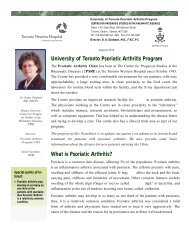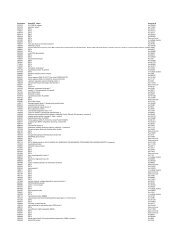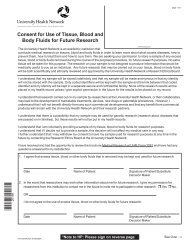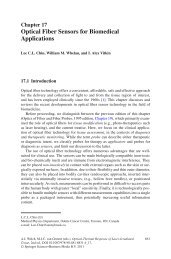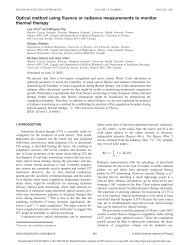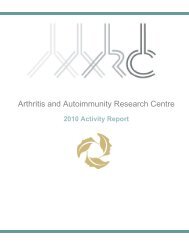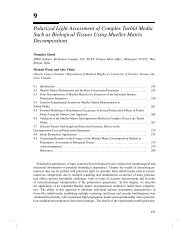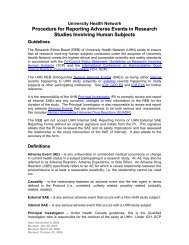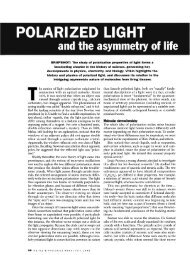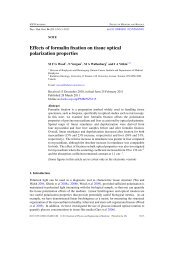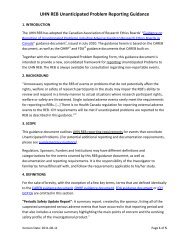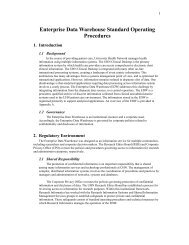Download the 2005 pdf - UHN Research
Download the 2005 pdf - UHN Research
Download the 2005 pdf - UHN Research
Create successful ePaper yourself
Turn your PDF publications into a flip-book with our unique Google optimized e-Paper software.
In an autoimmune<br />
disease, <strong>the</strong> immune<br />
system responds<br />
to bodily tissue <strong>the</strong><br />
same way it would<br />
respond to an invader<br />
—with harmful<br />
consequences.<br />
<strong>Research</strong> Points<br />
to Cause of<br />
Autoimmunity<br />
Why are some people<br />
more likely to develop<br />
an autoimmune disease<br />
than o<strong>the</strong>rs? Although<br />
many believe it may be<br />
due to a process called<br />
molecular mimicry, Dr.<br />
Pam Ohashi’s research<br />
suggests o<strong>the</strong>rwise.<br />
According to <strong>the</strong> <strong>the</strong>ory<br />
of molecular mimicry, people<br />
who develop autoimmune<br />
diseases such as diabetes<br />
or arthritis may have<br />
a naturally occurring protein<br />
that looks very much<br />
like a protein from a virus<br />
or bacteria. If <strong>the</strong>se people<br />
ever became infected with<br />
a “look-alike” pathogen,<br />
<strong>the</strong>ir immune cells could be<br />
spurred to attack <strong>the</strong>ir normal<br />
proteins as well as <strong>the</strong><br />
real pathogen. This results<br />
in autoimmune disease.<br />
Says Dr. Ohashi,“Our<br />
model shows for <strong>the</strong> first<br />
time that <strong>the</strong>re must be a<br />
very tight bond between<br />
<strong>the</strong> infecting pathogen and<br />
<strong>the</strong> attacking immune cells<br />
before autoimmune disease<br />
can develop. It also<br />
shows that most people<br />
have genes that protect<br />
<strong>the</strong>m from this process,<br />
indicating that molecular<br />
mimicry likely isn’t<br />
<strong>the</strong> cause.”<br />
Nat Med. 2004 Oct 3;<br />
10(11): 1234-39.<br />
<strong>UHN</strong>+ PARTNERS=<br />
New Standards of Evidence-<br />
Based Care in Prostate Cancer<br />
This year a <strong>UHN</strong> researcher led<br />
an international study which<br />
pointed to a new standard of<br />
treatment for men with advanced,<br />
incurable prostate cancer.<br />
One of <strong>the</strong> many challenges in<br />
clinical trials is to enrol a sufficiently<br />
large number of patients to get<br />
definitive proof for a conclusion.<br />
In this case, PMH’s Dr. Ian Tannock<br />
led a phase III trial supported by <strong>the</strong><br />
drug company Aventis which<br />
enlisted 43 oncologists with<br />
practices in 24 countries on six<br />
continents to test a new treatment<br />
regime for advanced prostate cancer.<br />
The two-year study involving<br />
1,000 men has proven that a drug<br />
called docetaxel, when taken in combination<br />
with prednisone, improved<br />
survival by an average of three<br />
months when compared to <strong>the</strong><br />
current treatment regime. It also<br />
had a greater chance of reducing<br />
pain and improving quality of life in<br />
patients with symptoms from <strong>the</strong>ir<br />
disease, although <strong>the</strong>re was some<br />
increase in toxicity.<br />
“Overall, treatment with docetaxel<br />
resulted in many patients feeling<br />
better and living longer,” says<br />
Dr. Tannock.“It is for this reason<br />
that we’re recommending<br />
docetaxel every three weeks,<br />
with daily prednisone, as <strong>the</strong><br />
new standard of treatment for<br />
patients with prostate cancer<br />
resistant to hormone <strong>the</strong>rapy.”<br />
In this case, <strong>the</strong> international,<br />
industry-supported partnership<br />
generated new hope for<br />
men with prostate cancer.<br />
N Engl J Med. 2004 Oct 7;<br />
351(15): 1502-12.<br />
UNIVERSITY HEALTH NETWORK 21




